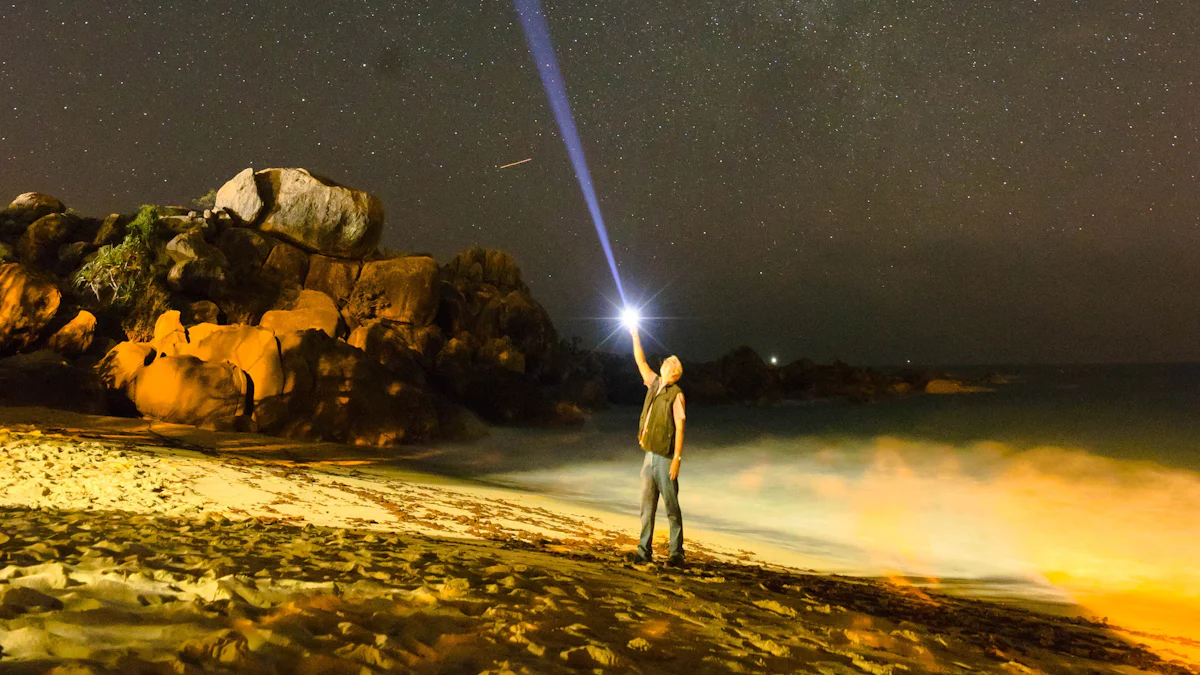Modes of flashlight

Introduction to Flashlight Modes
Flashlights are indispensable tools that serve a variety of purposes in our daily lives. From navigating dark spaces to outdoor adventures, flashlights are essential for providing illumination in times of need. Understanding the different modes of flashlight is crucial for maximizing their utility.
A Brief Overview of Flashlight Utility
Everyday Uses of Flashlights
Illuminating dark pathways during nighttime walks or hikes.
Providing light during power outages or emergencies at home.
Assisting with car repairs in low-light conditions.
Importance of Understanding Different Modes
Different modes offer varying levels of brightness and functionality.
Each mode is designed to cater to specific lighting needs, making it essential to comprehend their differences.
How Modes Enhance Flashlight Functionality
Energy Conservation
By offering adjustable brightness levels, different modes enable users to conserve battery life and prolong usage.
Enhanced Usability
The availability of multiple modes ensures that flashlights can be adapted to diverse situations, enhancing their overall usability.
Spotlight Mode: The Long-Distance Illuminator
Spotlight mode is a crucial feature of flashlights, offering a concentrated beam of light that extends over long distances. Understanding the unique characteristics and benefits of this mode is essential for maximizing its utility.
Understanding Spotlight Mode
Spotlight mode is particularly advantageous in situations where long-distance illumination is required. Whether it's spotting distant objects during outdoor activities or signaling for help in remote areas, this mode provides a powerful and focused beam that cuts through darkness with precision.
Ideal Situations for Spotlight Mode
Navigating through vast outdoor spaces such as forests, trails, or open fields.
Signaling for assistance or attracting attention from a distance during emergencies.
Exploring caves or other environments where visibility at a distance is crucial.
Benefits of Using Spotlight Mode
Enhanced visibility over extended distances, providing clarity and focus.
Increased safety and security by illuminating potential hazards from afar.
Efficient use of battery power due to the focused nature of the beam.
Personal Experience with Spotlight Mode
A Night in the Woods
During a recent camping trip, I found myself navigating through dense woods after dark. Activating the spotlight mode on my flashlight allowed me to clearly discern obstacles and potential hazards along the path. The focused beam not only illuminated my immediate surroundings but also reached far ahead, guiding me safely through the challenging terrain.
How Spotlight Mode Made a Difference
The spotlight mode proved to be invaluable when I needed to locate our campsite from a distance. Its powerful beam cut through the darkness, enabling me to spot our site well before reaching it. This experience highlighted how spotlight mode can significantly enhance visibility in low-light environments, providing both reassurance and practical assistance.
Floodlight Mode: Lighting Up the Immediate Area
Floodlight mode is a vital feature of flashlights, designed to illuminate immediate surroundings with a broad and expansive beam. Understanding the essence of floodlight mode and its practical applications is essential for leveraging its benefits effectively.
The Essence of Floodlight Mode
When to Use Floodlight Mode
Floodlight mode becomes indispensable in scenarios where wide-area illumination is required, such as camping, outdoor gatherings, or working in dimly lit spaces.
It offers a broader coverage area, making it ideal for lighting up campsites, backyard spaces, or emergency situations that demand widespread visibility.
Advantages of Floodlight Illumination
The broad beam of floodlight mode ensures comprehensive coverage, minimizing dark spots and providing an overall well-lit environment.
It enhances safety by illuminating a larger area, allowing individuals to navigate and perform tasks with ease even in low-light conditions.
My Encounter with Floodlight Mode
A Power Outage at Home
Recently, during a sudden power outage at home, I reached for my trusty flashlight equipped with floodlight mode. As the darkness enveloped the house, activating the floodlight mode instantly transformed the dim interior into a well-lit space. The expansive beam efficiently illuminated the entire room, alleviating any sense of unease caused by the blackout.
The Role of Floodlight Mode
The floodlight mode not only facilitated movement within the house but also provided a sense of security during the unexpected outage. Its wide-reaching illumination ensured that every corner was visible and accessible, allowing us to address the situation calmly and efficiently until power was restored.
Special Modes: Strobe, SOS, and Beacon
Flashlights offer special modes that serve distinct purposes beyond traditional illumination. Understanding the functionality and practical applications of special modes enhances the overall utility of flashlights in various situations.
Strobe Mode: For Visibility and Self-Defense
Practical Applications of Strobe Mode
Strobe mode serves as a versatile tool for enhancing visibility during low-light conditions. It is particularly useful for attracting attention in emergency scenarios or signaling for help during outdoor activities.
In addition to its visibility-enhancing capabilities, strobe mode can also be employed as a self-defense tool, disorienting potential threats with its rapid and intense light pulses.
My Personal Experience with Strobe Mode
During an evening hike in the wilderness, I encountered a situation where the visibility became significantly reduced due to unexpected fog. Activating the strobe mode on my flashlight immediately improved our visibility, allowing us to navigate through the challenging terrain with confidence. Furthermore, the disorienting effect of the strobe mode provided an added sense of security by deterring any potential wildlife encounters.
SOS and Beacon: Signals for Help and Navigation
How to Use SOS and Beacon Modes Effectively
SOS and beacon modes are essential features designed to convey distress signals or aid in navigation during outdoor expeditions. Understanding how to activate these modes can be crucial in emergency situations where communication or location assistance is required.
These modes typically emit specific patterns of light pulses, such as the internationally recognized Morse code signal for SOS (... --- ...), enabling users to communicate their need for help effectively.
A Real-Life SOS Mode Scenario
Recently, while on a boating trip, we encountered an unforeseen mechanical issue that left us stranded far from shore. By activating the SOS mode on our flashlight, we were able to attract the attention of nearby vessels, ultimately leading to our rescue. The distinct pattern of light emitted by the SOS mode served as a beacon of hope in a challenging situation, emphasizing the critical role these special modes play in ensuring safety and survival during outdoor adventures.
Choosing the Right Mode for Your Needs
When selecting the appropriate mode for your flashlight, several factors come into play to ensure that it effectively meets your specific requirements.
Factors to Consider When Selecting a Mode
Assessing the Situation
Before choosing a mode, it's essential to assess the environmental conditions and lighting needs. Consider whether you require long-distance illumination, broad area coverage, or special signaling capabilities. Understanding the specific demands of the situation will guide you in determining the most suitable mode for your current needs.
Understanding the Flashlight's Capabilities
Each flashlight comes with its unique set of modes and capabilities. Familiarize yourself with the available modes on your flashlight and their respective functions. Take into account factors such as battery life, brightness levels, and ease of mode selection. By understanding your flashlight's capabilities, you can make informed decisions when choosing the right mode for any given scenario.
Conclusion: Empowering Your Flashlight Use
In conclusion, mastering the various modes of your flashlight empowers you to harness its full potential across diverse situations. Whether it's spotlight mode for long-distance visibility, floodlight mode for immediate area illumination, or special modes for signaling and communication, each mode serves a distinct purpose. By experimenting with different modes in varied settings, you can gain valuable insights into their practical applications and optimize your flashlight use accordingly.
Recap of Modes and Their Uses
Encouragement to Experiment with Modes
2024/5/8
See Also
Exploring Various Kinds of Flashlights
Comparing Law Enforcement Flashlight with Standard One
Crucial Guidelines for Flashlight Upkeep
Grasping the Meaning of a Tactical Flashlight
Choosing Between Adjustable Beam Flashlight and Reflective Cover

